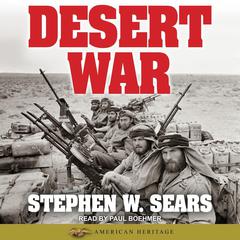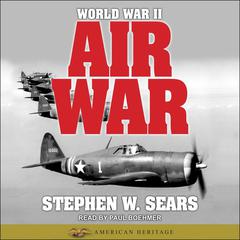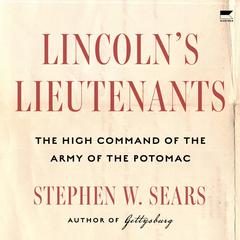 Play Audiobook Sample
Play Audiobook Sample
Chancellorsville Audiobook
 Play Audiobook Sample
Play Audiobook Sample
Quick Stats About this Audiobook
Total Audiobook Chapters:
Longest Chapter Length:
Shortest Chapter Length:
Average Chapter Length:
Audiobooks by this Author:
Publisher Description
A former editor of American Heritage, Stephen W. Sears has collected a wealth of new sources for this definitive portrait of one of the most dramatic battles of the Civil War. Using scores of letters and diaries written by soldiers from both Union and Confederate armies, Sears' narrative history seeks to strip away the gloss of later commentary and restore the battle of Chancellorsville to its original voices. Chancellorsville is often touted as Robert E. Lee's greatest victory. Prompted by a campaign that maneuvered brigades on both sides into complex positions, it culminated in the most intense hours of fighting in the entire Civil War. But when the battle was over, the price of victory had been high. Stonewall Jackson was mortally wounded. Lee was committed to press north into more threatening odds. In Chancellorsville, Stephen Sears carefully traces the movements of both armies and offers fascinating vignettes of daily life within the ranks. Looking at issues from horse fodder to critical military strategy, he examines the personal and military cost of this historic clash of armies.
Download and start listening now!
"A powerful work of American combat fiction. Perhaps the first of its kind in describing the feelings and emotions of a soldier "in the trenches" during the American Civil War. It is a very short work of fiction, but don't judge it's relative size by the gut-wrenching force it can pack at times. It is both emotional and gruesome, which for a combat novel of its day would make it well ahead of its time. In fact, I would say that most of the modern writers of combat--both fiction and non-fiction--were very influenced by this novel and would bet that many of them have worn, dog-eared copies someplace in their collection."
— Brian (4 out of 5 stars)
Quotes
-
“The finest and most provocative Civil War historian writing today.”
— Chicago Tribune -
“Sears, employing a mix of published and unpublished primary accounts to buttress secondary studies, manages to offer more than one new word in a thoroughly engaging text…A model campaign study, Sears’ account of Chancellorsville is likely to remain the standard for years to come.”
— Publishers Weekly (starred review) -
“The finest rendition of the battle yet and an interesting thesis for Civil War discussion.”
— Amazon.com, editorial review -
“Splendid…Civil War history at its best.”
— Booklist -
“A stunning analysis of how terrain, personality, chance, and other factors affect fighting and distort strategic design…A tour de force in military history.”
— Library Journal
Chancellorsville Listener Reviews
-
" Sears' volume is a very comprehensive and detailed account of the Gettysburg campaign. It provides a useful balance of big picture strategic analysis with on the ground tactical details. Still probably the best one volume assessment of the campaign on the market. "
— BW, 12/24/2018 -
" This is still probably the best single synthesis narrative on the Chancellorsville Campaign on the market. Sears provides excellent research, balances between the tactical and strategic and most importantly challenges many of the long held myths about the campaign at its commanders. "
— BW, 11/28/2018 -
" I originally read this book for school. Henry certainly isn't a likeable character but certainly relatable through his cowardice and insecurity. The main thing that makes me judge this book so harshly is that Stephen Crane never saw a battle, and the book gets really tedious to get through. "
— Clara, 2/17/2014 -
" This was a short read, it really captures the feel of a youth going into battle, all the emotions and growth that can come from it. Very vivid imagery. I can understand why it is a classic! "
— Jim, 2/15/2014 -
" I read this book in high school and remembered loving it. I was eager to re-read the book and was surprised when I had a very difficult time getting immersed in the story. Still a great story, just no longer as relevant to me. Unfortunately this fell from my top book list after reading it as an adult. "
— Leah, 2/5/2014 -
" As this was a book that was put as an 8th grade summer read for my school, I wasn't expecting much. At first, I was bored, as I had "other things to do" in the summer. But once I went off to my native country and there was nothing to do, I started to really love it. The descriptions were amazing, and though the dialog was sometimes confusing, the action made up for it. I was amazed, upon coming back to school, that many were confused and disliked this book. I enjoyed it a lot, though some points were confusing for me, but all this was resolved by a second time through. "
— Bookthief, 1/27/2014 -
" It's a war novel, and though set in the midst of a Civil War battle, the real struggle is in the mind of the inwardly-conflicted main character, Henry Fleming. To me, it wasn't exactly a gripping tale, but the psychological insight was interesting. "
— Scott, 1/19/2014 -
" Amazing imagery, thoughtprovoking action, very real characters... Yep, I like it. "
— Kaitlin, 1/10/2014 -
" I was never assigned to read this book in elementary school but I know of a lot of people who were, so I decided to read it. Although I found parts of this book to be quite boring, it really helped me appreciate the Civil War. "
— Amber, 1/7/2014 -
" I read this back in... 8th grade, and I remember having to focus a lot on the progression of the main character as he grows and develops through the story; just like any young man going to battle, war changes a person, and the author does a good job showing him working through these hard choices "
— Shannon, 1/5/2014 -
" This was mandatory reading for me in high school and I believe it still is for many! I still consider it among my favorite books of all time and have been recently thinking I need to re-read as an adult. "
— Tara, 1/1/2014 -
" This book really showed the main character's development well. It isn't something I would voluntarily read a lot, but it isn't bad at all. "
— Byrel, 12/10/2013 -
" this book is trash... Crane was a fool writing about something he knew nothing about. "
— Dustin, 12/7/2013 -
" I had to read this in HS. This has got to be the worst book I ever read. Hope they dont make kids still read this garbage in school "
— Michele, 9/19/2013 -
" what was the actual point of the story??? if i were reading it, i'd have given up early on...but listening to it in the car, i was able to suck it up...but still, it seems like it had no visible plot... "
— Val, 9/8/2013 -
" Made it to page 44. "
— Elise, 7/28/2013 -
" The subject is good but the writing is great! "
— Russell, 3/12/2013 -
" Felt like I was stuck in the mind of a rambling egotist. Very little dialogue between characters that was worth anything. Some transitions were very broken and confusing. "
— Erick, 3/9/2013 -
" hard hitting book on the rough reality of war in the mid-1800s. Crane also offers the reader a peek into the inherent irrationality of the teenage years. "
— Justin, 1/17/2013 -
" Fittingly, I finished this on Veterans' Day. This is not the same book that I read in high school. "
— Laurele, 1/9/2013 -
" Great historical fiction about what it feels like in a hard battle in war. "
— Keith, 10/9/2012
About Stephen W. Sears
Stephen W. Sears is the author of many acclaimed books on the Civil War including Chancellorsville and Gettysburg. He has been called “the finest and most provocative Civil War historian writing today” (Chicago Tribune). A former editor at American Heritage, he lives in Connecticut.
About the Narrators
Richard Davidson has appeared on Broadway in I Hate Hamlet, Ghetto, and The Survivor, and off-Broadway in Bedfellows and Hurrah at Last. His television and film credits include Law & Order, Law & Order: SVU, and The Hurricane.
Richard M. Davidson is an actor and Earphones Award–winning narrator. Trained at the London Academy of Music and Dramatic Art, he is well versed in theater and has had a long-standing career in acting, including a lead role in the show Diamonds, which aired on the CBS network, and a part in ESPN’s The Hustle.































